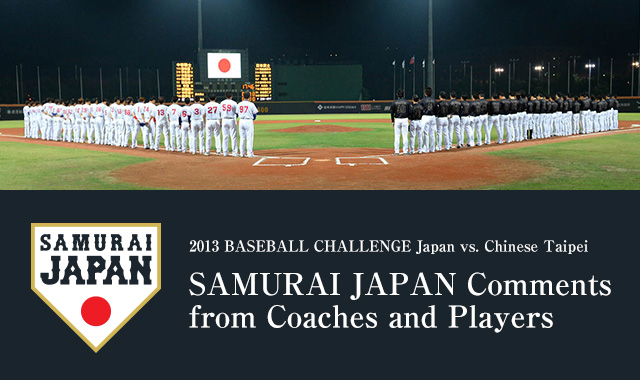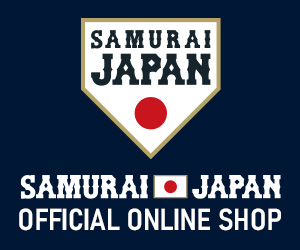*The material for this article was gathered before the 3rd game started.
No. 89 Coach Yoshitaka Katori
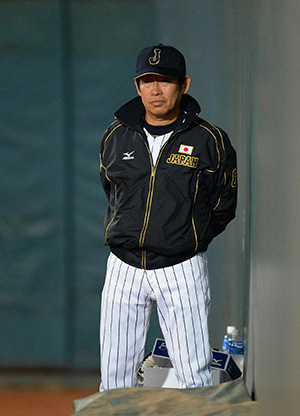
----Tell us what has happened so far.
Katori:I think the pitchers that were chosen this time have gotten a tremendous amount of useful experience. They've been able to experience the strong feelings of playing away games that you can't get in Japan. They've been able to experience a sense of nervousness that they haven't had before and that is a good thing. Even if you want to experience it you can't and so I think this experience will be useful in the future.
----Are the Japanese pitchers on a world class level that we can be proud of?
Katori:I think the overall ability of the Japanese pitching squad is the best in the world. This is especially true when it comes to control. They might not be a match when it comes to speed but I think they are the best in the world in other areas. I think we were able to show that quite clearly on this tour.
----In international tournaments, what tendencies make for pitchers who get good results?
Katori:About that, you can understand clearly by looking at the pitchers from our opponent countries. That is to say, my thinking is that the batters from the pitchers own countries are the ones who are able to deal with the balls they throw. So, it follows that if we aren't able to pitch the types of balls that pitchers from those countries can't pitch, then we won't be able to defeat them. If you look at the pitchers from those countries then you'll more or less be able to find the answer to your question.
----I see.
Katori:Japanese pitchers come up short against foreign pitchers when it comes to speed. Japanese batting line ups have tough games against pitchers who are good at using two seam fastballs and changeups with speed on them. That's because we don't see those types of pitchers in Japan. I think we should think about that while planning our counterstrategy in upcoming international tournaments.
No. 80 Coach Hirotami Kojima
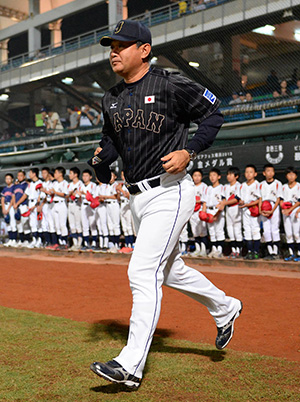
----Looking back on the new Samurai Japan, how's it going so far?
Kojima:I think Manager Kokubo's thoughts on baseball have penetrated down to every player. Also, all of the staff members thoroughly understand his plans and we are going to give it our all. I think it is a really great team.
----What do you feel are the strengths and weaknesses of Japanese baseball?
Kojima:I think we'll see them soon enough. Also, we aren't just going to be playing against one country. There isn't just one way to play. For that reason, I think it will be important for the future to gain a lot of varied experience. In the end this organization is a team so we will win or lose depending on whether or not we have unity of spirit and whether or not we can keep working on the details. That's why it's good to go on tour and have training camps regularly. By repeating those things we become stronger. Also, in the past four years I've learned how to determine whether a player was suitable for international tournaments or not, to evaluate them based on that division. Tough jobs like that have to be done.
----After seeing so many amateur players over the years, is their some special quality that makes them successful in international tournaments?
Kojima:I think things haven't changed since we were playing. There are many things like the environment and the daily situation that can't be taken for granted like they are in Japan. The food is strange, too. In the middle of all that you have to perform as you normally do. That's what international tournaments are all about. You can't let those factors outside of baseball distract you.
----I see.
Kojima:You also have to be physically tough. That's because you play several games in a row and become more exhausted than you would just playing one game at home. Compared to this time, at the actual WBC we'll have to play while being more nervous. You have to have a tough mind and a tough body. That's what international tournaments are.
----What impressions have you gotten of Manager Kokubo during this tour?
Kojima:I didn't feel he was high handed. It was the first game but he was quite relaxed. He has a very good grasp on the players.
----How about the future?
Kojima:Well, we haven't lost yet. It's after a loss that you see what kind of team you really have. When you're winning whatever you do is fine. What you do after the first loss is important. After that you can learn a lot. As for coaches, once the manager has built a team the last thing is to find a staff that works well with them, that jells well with them. That's why I feel that you don't just need one, but two coaches who can be with the manager over the long term and watch over the team.
No. 88 Coach Akihiro Yano
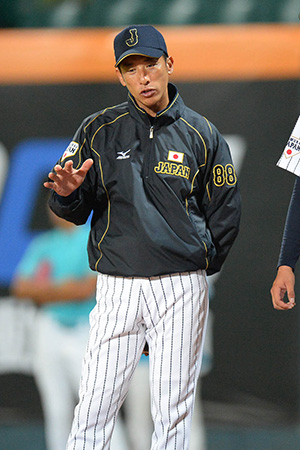
----Looking back, tell us how things are going so far.
Yano:I don't have any experience as a coach so I feel the players are helping me along. The pitchers are doing their best and getting good results. Naturally I'm happy when we win. I'm even happier when the pitcher and catcher combos give it their all and we win. Even if it's not a catcher I've given special instruction to, if he takes an active part in the game then I'm happy. I've felt that really strongly this first time I've been able to coach.
----So the team atmosphere is really good then.
Yano:Basically the players are under 26, them being around the same age, the atmosphere is really good. Shima also helps by urging the younger players on and creating a good mood. We coaches feel this strongly as well.
----What's your impression of Chinese Taipei this time?
Yano:They are big and have really got a lot of potential. If they can play accurate and detail oriented baseball, then Japan will have to watch out. That's how good I feel their raw material is.
----What do you feel are the strong points of Japanese baseball?
Yano:I think Japan has pitching ability that anyone in the world would be proud of. We have good corner work and the ability to deliver the ball low, so the control Japanese pitchers have is a factor that we can be proud of when compared to anyone in the world. Also, when it comes to the catchers' ability to read accurately, Japan is at a high level. I want to use these Japanese strengths as weapons by putting them in the forefront of our game.
No. 87 Coach Nishi Toshihisa
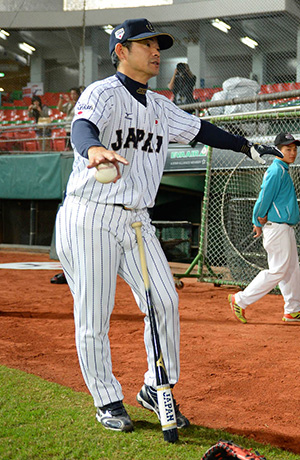
----Looking back on the game against Chinese Taipei, how are things going?
Nishi:I've got all I can handle doing my job///I'm giving it my best but don't have anything left myself (smiling wryly). Partly because the players are young though, they play with all their might even including urging each other on with words. They have fun and do things with a lot of vigor.
----So the atmosphere of the team is good.
Nishi:Shima really pulls everyone together just like a captain should. Kaneko also is always making an all out effort to keep spirits up by cheering others on. Everyone is working hard and it's a good atmosphere. I think it really is a good team.
----What's your impression of your opponent this time, Chinese Taipei?
Nishi:I've been playing against them since my own days as an amateur and I have a strong impression of them as a powerful type of team. For a long time they've also always had good pitchers. The pitchers this time are like the type who play in America. They have an extremely high degree of skill. They have strong batters too.
----During this tour what strengths of Japanese baseball were you able to feel directly?
Nishi:The players this time were young in terms of age and may not have much depth of experience but I think Japanese baseball players start getting a sound baseball education when they are still small. After all, Japanese high school baseball has a tremendous amount of content and so many players are getting a thorough education at an early period in their lives. I think this is a strength of Japan and also part of our culture.
----This time what did you feel as third base coach?
Nishi:This time I felt we did almost no sign play and carried out simple baseball. We just played based on the team members' real ability. Also, I feel that we are just at the beginning stages of the team's strength. If we work hard on more detailed baseball then there are many more things we can do. From the point of view of the bench though, the most desirable thing is when the players themselves feel what they have to do and work on it themselves. I'm grateful for that. In the end, more than players who wait for instructions, the players who think for themselves and are in the habit of taking the initiative are better players. This team may be young but on that point they've really got things together. Each person has a very high degree of ability and I admire them for having such firm characters.
----What do you think is demanded of a coach for Samurai Japan?
Nishi:It's difficult being a coach. The coach's game is limited in what we can do at the actual place. That's true of time as well. To be honest, the role of a coach comes with problems piled on problems.
----The way you directed Asamura in throwing at the Giants Stadium was quite impressive.
Nishi:We really only have a short time...and if you say too much you're thought of as nagging them...you know(smiling wryly). You just have to try to tell them what they need to hear in messages with a single point. I think it's best to tell them things only to the extent that we don't come across as being bothersome.
Latest Article
 |
RAXUS SAMURAI JAPAN SERIES 2025 JAPAN vs KOREA roster announcement 10/8/2025 |
|---|
 |
2nd WBSC Youth Baseball5 World Cup 2025 roster announcement 9/7/2025 |
|---|
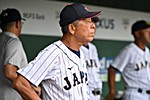 |
WBSC U-18 Baseball World Cup 2025 presented by RAXUS roster announcement 8/23/2025 |
|---|
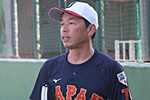 |
31st BFA Asian Championship 2025 roster announcement 8/22/2025 |
|---|
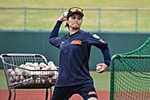 |
4th BFA Women's Baseball Asian Cup roster announcement 7/22/2025 |
|---|



